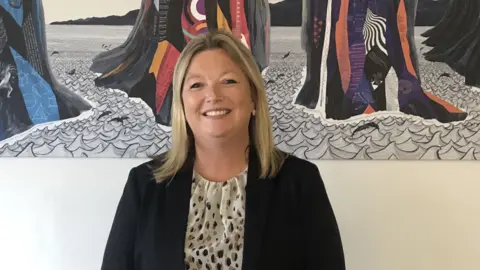Hundreds of SEN kids missing from school - report
 Getty Images
Getty ImagesHundreds of children with special educational needs (SEN) are completely missing from education in England, analysis suggests.
Children with SEN make up 22% of the 2,900 children not enrolled at a school or being suitably educated elsewhere - which is disproportionately high, as 16% of children in state education have SEN, the report says.
Children's commissioner Dame Rachel de Souza, who produced it, said provision for children with SEN was “the number one thing that needs sorting out alongside attendance to make sure our kids can go to school”.
The Department for Education said the report showed there were "far too many children falling through the cracks".
'We do not know where they are'
Data from the children's commissioner's office for the 12-month period between the spring terms of 2022 and 2023 suggested 11,600 children were missing from education at some point during that time.
Many of those had worked their way back into the education system by the end of that period. However, 2,900 were last recorded as being missing from education, meaning they were not registered at any school or known to be learning at home or somewhere suitable elsewhere.
"I think people would be stunned that there are that many children in this country that we do not know where they are," Dame Rachel told BBC Radio 5 Live.
She said it was a "scandal" that children missing from education were "not on anybody's radar".
 PA Media
PA MediaChildren missing from education (CME) are those of school age who are not registered pupils at a school or receiving suitable education elsewhere, such as at home.
They are different to children who are persistently absent, who are pupils registered with a school who miss at least 10% of their time there or the equivalent of at least one day per fortnight.
Dame Rachel said managing the SEN crisis and improving attendance were the top priorities for getting children back into schools.
According to a Teacher Tapp survey commissioned by BBC Radio 5 Live, 28% of school leaders across the state sector said SEN funding was their top financial concern.
That figure rose to 44% among primary school leaders.
At Varndean School, in Brighton, 100 pupils have an education and healthcare plan (EHCP) - a legal document setting out what a pupil's specific educational, health and social care needs are and what is required by various service providers to meet them.
Head teacher Shelley Baker said there had been a "huge" rise in the number of her students with special educational needs and disabilities, to 30% in the past year - far higher than the national average.

"For every student that comes with any EHCP, that's an extra resource of a good couple of weeks on a member of staff that we don't have," Mrs Baker said.
"So we have to be really creative and work closely with our families to make sure that child gets the support they really need.”
But only a fraction of SEN children get an EHCP - plans which are funded by local authorities.
Some parents even go to tribunals to secure one, with many local authorities forecasting large shortfalls in their SEN budgets.
According to a survey by the charity Support Send Kids, 41% of parents with SEN children say they have had to leave their jobs to spend time pursuing their children’s legal rights to support.
However, even those with an EHCP can struggle to find specialist school places and often cannot be provided for in mainstream education.
The children's commissioner's data suggested 13,100 children had left the state education system during the period between the spring terms of 2022 and 2023, and had subsequently been taught at home. Nearly one in three of those were SEN children.
Stephanie Darrah quit her job in December last year and moved her family from Staffordshire to Norfolk after her seven-year-old son Glen, who was diagnosed with autism and has an EHCP, struggled to fit in with mainstream schooling.
Glen is now taking part in an outdoor education placement and receives nine hours of tutoring per week but is still without a permanent school place.
She said children had been failed by a lack of funding but added that there were a "lot of great people out there fighting the system from within and doing their best to support these kids".
 Stephanie Darrah
Stephanie DarrahAlthough children recorded as being in suitable home education are not classed as being missing from education, Dame Rachel has called for each child to be given a unique identifier, similar to an NHS number, to help track those who are.
Supporters say it would help agencies like schools and social services to speak to each other across council borders.
It was also a promise Labour made in its election manifesto.
A Department for Education spokesperson said Dame Rachel's report laid "bare the scale of the challenge to the education system".
It said the government will bring in a law so that councils must produce and maintain registers of children not in school, "ensuring fewer young people slip under the radar".
- Listen live to special coverage from inside our schools on Tuesday 10 September, from 06:00 BST on Radio 5 Live.
